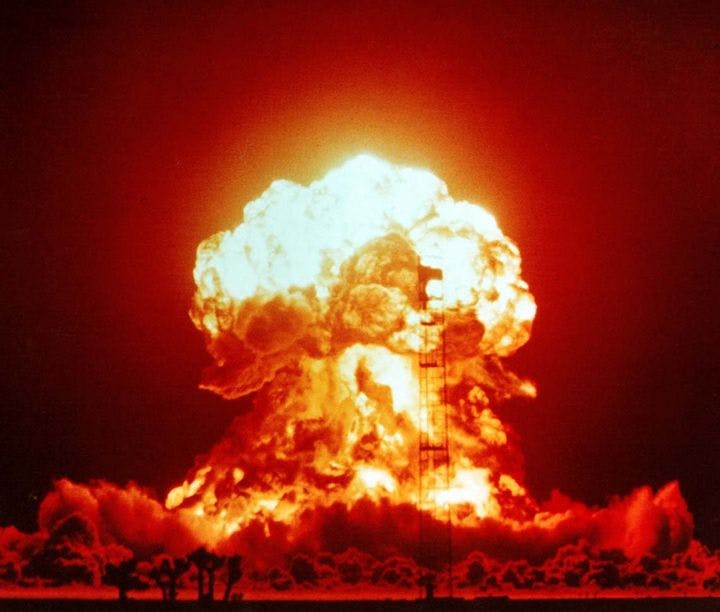Nuclear Disarmament Should Be Considered A Moral Issue
– Shannon Mizzi
Policy wonks shouldn't be the only ones campaigning for a nuke-free world.
In the post-Cold War debate over the development and ownership of nuclear weapons, complete disarmament has become an increasingly viable option. Disarmament advocates, however, have curiously failed to employ strong moral arguments against the continued existence of nuclear weapons, preferring to instead focus on political and strategic security. That should change, writes Paolo Foradori in The Nonproliferation Review, and nuclear disarmament advocates would be wise to embrace a new potential partner: the Catholic Church.
Although the political tenor of the Cold War prevented nuclear abolition from becoming a viable long-term option, the politics of the issue has changed — even Henry Kissinger and George Shultz now advocate disarmament. But Foradori cautions against allowing disarmament to be seen as a simply technocratic cause; the movement has the potential to be revolutionary, but can do nothing effective without grassroots momentum.
It is hard to dispute the fact that nuclear weapons use would “violate longstanding moral principles of proportionality in the use of force,” writes Foradori, “and that it is wrong to kill the innocent and to cause excessive destruction.” Enter the Roman Catholic Church.
As of 2013, there are approximately 1.2 billion people who identify as Catholic. With its ultra-organized and hierarchical structure, the Church has incredible potential to influence the opinions and beliefs of hundreds of millions. Throughout history, the Vatican has tended to support the theory of “just war”, rather than outright pacifism. “Its core argument,” says Foradori, “is that the use of force in international affairs is morally legitimate and justifiable under certain conditions and limitations … government cannot be denied the right of lawful self-defense, once all peace efforts have failed.” Theoretically, in order to be “just,” war must be conducted between legitimate countries with the intention of bringing about a swift peace, and civilians must be protected as much as possible.
The Church supported nuclear deterrence during the Cold War, but rejected the indiscriminate use of nuclear weapons as immoral, as confirmed in 1965 at the Second Vatican Council. Since Vatican II, however, the Church has reversed course. Currently, it supports the idea that deterrence is tolerable only as part of the progression toward total disarmament, and does not consider it a permanent mechanism for preventing nuclear war. The 1983 U.S. Conference of the Catholic Bishops declared total disarmament the only morally acceptable solution. In 2005, the Vatican asserted that “it is evident that nuclear deterrence is preventing genuine nuclear disarmament.” That posture has continued under Pope Francis, who has declared that “the Holy See does not countenance the continuation of nuclear deterrence, since it is evident it is driving the development of ever newer nuclear arms.”
The spectre of nuclear war will continue to haunt the world until nuclear weapons no longer exist; the potential for nuclear warfare will only increase, in spite of deterrence strategies and non-proliferation efforts. Foradori argues that nuclear weapons and deterrence are “poorly suited to countering the main security threats of the twenty-first century: international terrorism, failed states, asymmetric warfare, transnational crime, piracy, cyberwarfare, migration pressures, energy shortages, contagious diseases, and natural and man-made disasters.” It is for these reasons, as well as increasing questions about the morality of the continued existence of nuclear weapons, that nuclear disarmament has become a truly feasible and truly global strategy.
“Calls for disarmament have a universal validity that cannot be accused of concealing national interests, as politico-security arguments can.” Moral arguments are potent, but underused, tools in the quest to ban nuclear weapons, and grassroots public support is absolutely essential for disarmament to take place. A colossal organization like the Catholic Church, with the potential to mobilize the moral beliefs of millions — both Catholic and non-Catholic — would be a compelling addition to the arsenal of abolitionists.
* * *
The Source: “The Moral Dimension of Global Zero” by Paolo Foradori, The Nonproliferation Review, Oct. 2014
Photo courtesy of Wikimedia Commons
